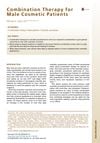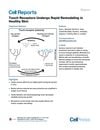 2 citations,
October 2015 in “Indian journal of science and technology”
2 citations,
October 2015 in “Indian journal of science and technology” SM-215 promotes hair growth by improving the environment around hair follicles.
 1 citations,
December 2010 in “InnovAiT”
1 citations,
December 2010 in “InnovAiT” The document concludes that accurate diagnosis and appropriate management are crucial for treating various hair disorders, which have significant psychological impacts.
 July 2024 in “Frontiers in Pharmacology”
July 2024 in “Frontiers in Pharmacology” Pilose antler extracts help hair growth by activating hair follicle stem cells.
 April 2024 in “bioRxiv (Cold Spring Harbor Laboratory)”
April 2024 in “bioRxiv (Cold Spring Harbor Laboratory)” GRK2 is essential for healthy hair follicle function, and its absence can lead to hair loss and cysts.
 February 2024 in “Journal of applied pharmaceutical research”
February 2024 in “Journal of applied pharmaceutical research” Herbal hair oils with Coconut, Curry leaves, Amla, Fenugreek, and Onion promote hair growth and are safe.
 September 2023 in “Stem cell reviews and reports”
September 2023 in “Stem cell reviews and reports” Scientists found a new, less invasive way to get stem cells from horse hair for veterinary medicine.
 September 2018 in “The Medical Journal of Cairo University/The Medical Journal of Cairo University”
September 2018 in “The Medical Journal of Cairo University/The Medical Journal of Cairo University” Polarized light therapy helps hair regrowth in alopecia areata patients.
 April 2018 in “Journal of Investigative Dermatology”
April 2018 in “Journal of Investigative Dermatology” Minoxidil didn't significantly increase hair growth in minipigs.
 January 2018 in “Springer eBooks”
January 2018 in “Springer eBooks” Gender affects hair and scalp characteristics, with differences in hormone responses, graying patterns, and trace metals.
 January 2016 in “Human & Experimental Toxicology”
January 2016 in “Human & Experimental Toxicology” A specific DNA sequence caused hair loss in male mice by activating immune cells and increasing a certain immune signal.
 January 2012 in “Elsevier eBooks”
January 2012 in “Elsevier eBooks” Hair transplantation is highly effective with careful technique and attention to patient needs.
 37 citations,
August 2013 in “Facial Plastic Surgery Clinics of North America”
37 citations,
August 2013 in “Facial Plastic Surgery Clinics of North America” Facial hair restoration is generally successful and satisfying for patients when done with quality techniques and realistic expectations.
 17 citations,
January 2015 in “Current problems in dermatology”
17 citations,
January 2015 in “Current problems in dermatology” Understanding and treating hair disorders in different ethnic groups requires knowledge of specific hair care practices and hair characteristics.
 17 citations,
October 2012 in “Dermatologic clinics”
17 citations,
October 2012 in “Dermatologic clinics” Treating excessive hair in women requires a holistic approach, including medical, aesthetic, and emotional support.
 1 citations,
January 2019 in “Springer eBooks”
1 citations,
January 2019 in “Springer eBooks” Hidradenitis Suppurativa is a chronic skin condition best treated early with surgery for better outcomes and less recurrence.
 157 citations,
April 1994 in “Clinical endocrinology”
157 citations,
April 1994 in “Clinical endocrinology” Androgens can cause hair growth in some areas and hair loss on the scalp.
 14 citations,
August 2013 in “Facial Plastic Surgery Clinics of North America”
14 citations,
August 2013 in “Facial Plastic Surgery Clinics of North America” Some nonsurgical hair loss treatments are effective, especially if started early.
 1 citations,
April 2024 in “Journal of Pharmaceutical and Pharmacological Sciences”
1 citations,
April 2024 in “Journal of Pharmaceutical and Pharmacological Sciences” The mouse models are effective for testing new hair loss treatments.
 10 citations,
June 2019 in “International Journal of Cosmetic Science”
10 citations,
June 2019 in “International Journal of Cosmetic Science” Some plant-based chemicals may help with hair growth, but more research is needed to confirm their effectiveness.
 13 citations,
January 2014 in “Aesthetic Surgery Journal”
13 citations,
January 2014 in “Aesthetic Surgery Journal” Cyperus rotundus oil effectively reduces unwanted hair without side effects.
 5 citations,
February 2004 in “The New England Journal of Medicine”
5 citations,
February 2004 in “The New England Journal of Medicine” The book provides updated knowledge on hair disorders and new treatments for hair loss.
 31 citations,
September 2014 in “Journal of Pharmaceutical Sciences”
31 citations,
September 2014 in “Journal of Pharmaceutical Sciences” Using a special laser can improve how well hair loss treatments get into the skin and hair follicles.
 181 citations,
January 2009 in “Nature Genetics”
181 citations,
January 2009 in “Nature Genetics” Certain mutations in a hair growth-related gene cause a type of genetic hair loss.
 28 citations,
March 2017 in “Scientific Reports”
28 citations,
March 2017 in “Scientific Reports” Minoxidil may protect nerves and improve hair quality during paclitaxel treatment.
 4 citations,
March 2022 in “Frontiers in pharmacology”
4 citations,
March 2022 in “Frontiers in pharmacology” Prunus mira Koehne is valuable for hair growth and has potential for sustainable use, but needs more research and conservation.
 1 citations,
November 2017 in “Dermatologic clinics”
1 citations,
November 2017 in “Dermatologic clinics” Combination therapies can improve hair loss treatment results and boost self-confidence in men.
 January 2020 in “Elsevier eBooks”
January 2020 in “Elsevier eBooks” Plant-based chemicals may help hair growth and prevent hair loss but need more research to compete with current treatments.
 January 2008 in “Elsevier eBooks”
January 2008 in “Elsevier eBooks” More men are getting cosmetic surgery, with nose jobs and hair transplants being popular, and choosing a qualified surgeon is important.
 31 citations,
November 2016 in “Cell Reports”
31 citations,
November 2016 in “Cell Reports” Touch sensitivity in mouse skin decreases during hair growth due to changes in touch receptors.
 28 citations,
November 2020 in “Journal of Controlled Release”
28 citations,
November 2020 in “Journal of Controlled Release” A new hair loss treatment uses tiny needles to deliver a drug-loaded lipid carrier, promoting hair growth more effectively than current treatments.






























